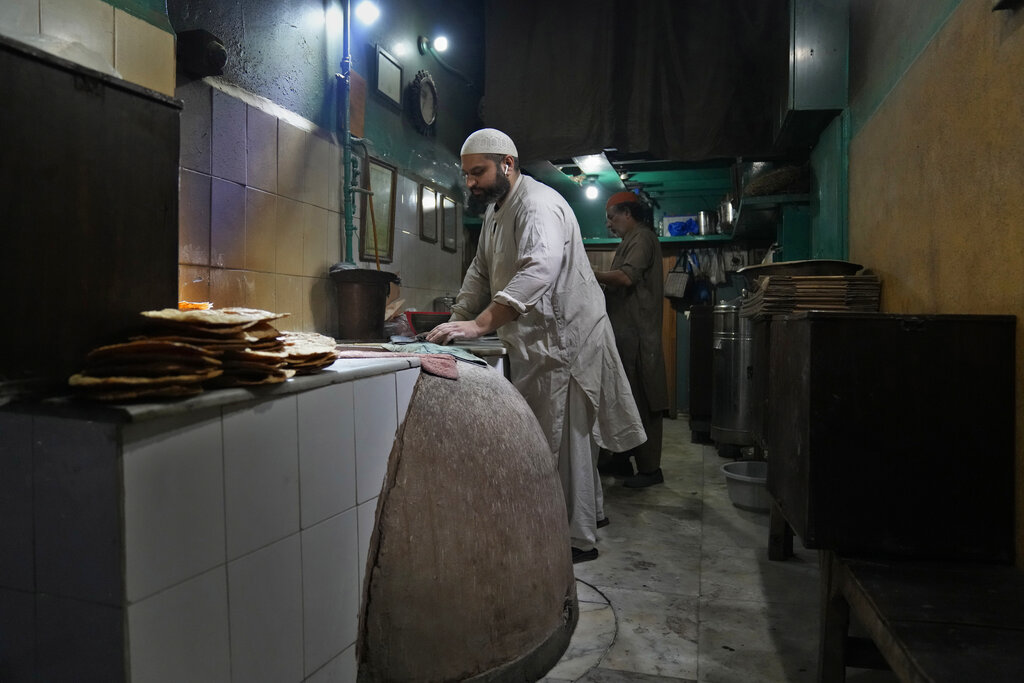メニューなし。デリバリーなし。飛び込み客お断り。予約客のみ。食事しながら説明と指示あり。
パキスタン東部ラホールの隠れ家的レストラン「ベーキング・ビルサ(Baking Virsa)」へ、ようこそ。ここはフラットブレッドやケバブなどの家庭料理を提供する「パキスタンで最も高価なレストラン」だ。
メニューの数は少なく、オーナーは大柄。頑固で「必要以上のサービスは一切いたしません」という、ほかのレストランとは一味違うダイニング体験を提供するこの店には、パキスタン国内外から好奇心をそそられた客が数多く集まってくる。
窓のない店内は、人や車、動物、そして屋台がひしめくガワルマンディのレイルウェイ・ロードに面している。レストランで朝食の準備が始まる時間帯になると、早朝からパンが焼ける香り、魚や肉を焼く香り、スパイスの効いた香り…など、様々な香りが漂ってくる。

AP Photo / K. M. Chaudary
ラホールはパキスタンのグルメタウンで、ガワルマンディはレストランやカフェが立ち並ぶ歩行者天国として知られていた。
ガワルマンディの住人には、インドとパキスタンがイギリスから独立(1947年)する以前にカシミール地方やパンジャブ州東部から移住してきた人々が多い。ヒンズー教徒やシーク教徒、イスラム教徒が混在することで商業や文化、そして食文化が豊かに花開いた。
ラホール城壁都市局のカムラン・ラシャリ局長によると、かつてのガワルマンディは治安上の理由などから、高級住宅地に暮らす人々に「(事実上)立ち入り禁止区域」とみられたこともあったという。しかし、20年以上前に町全体がリニューアルしたことで多くの人が訪れるようになり、食堂が軒を連ねるようになった。
「大道芸人もいました。ムシャラフ大統領も大勢の人に囲まれて座っていましたよ。ヨルダンの王子が来ましたし、インドの新聞でガワルマンディのことが報じられたこともありました」とラシャリ氏は言う。
この界隈のレストランは、安くて陽気な店が多い。
そして、そこにあるのがベーキング・ビルサだ。ここでは2人で夕食を食べるとすぐに60ドルかかってしまう。しかもドリンクはなし。ここではドリンクは水さえでてこない。参考までに、首都イスラマバードでは5つ星ホテルのセレナホテルでナンが1かごあたり1ドル、ケバブ1皿が8ドル。ガワルマンディではナン1枚が通常10セント以下だ。

AP Photo / K. M. Chaudary
ベーキング・ビルサで出される料理のレパートリーはわずか5種類:チキン、チョップ、2種類のナン、そしてケバブのみ。オーナーのビラル・スーフィー氏はバターの香ばしい香りとサクサクした食感のペストリー、バカルカニも販売しており、こちらも繁盛している。桃色のカシミール・チャイと一緒に食べるのが人気だとか。すべて持ち帰り可能だが、テイクアウトでも店内で食事をする場合でも数日前に予約が必要だ。
34歳のスーフィー氏は自身の店を「レストランではなくタンドール(粘土でできた大きな窯)」だと表現している。この店は75年前の創業以来ずっとこの場所で、何十年も変わらぬ味を提供している。
スーフィ氏は、「自分は父や祖父がやってきたことをやっているだけです」と話しつつ、マリネ液の材料から調理法、肉の産地、動物の飼育方法にいたるまで詳しく説明してくれた。彼が所有する羊は、サフランミルク、デーツ、まだ熟していないバナナをエサにしているという。
また、食べ方にもこだわりがあり、客などに「手でつまんで! 大きな口を開けてかじって!獣のように食べて!」とすすめるのだという。
電話で問い合わせてきた客に対しては、サラダもなければ、ヨーグルトもチャツネもありません、と彼は伝えている。「頼んでも出てきません」。

ベーカリー・ビルサの食事を楽しみに待つ人々。 AP Photo / K. M. Chaudary
スーフィ氏はこの店の3代目。父親のスフィ・マスード・サイード氏、祖父のスフィ・アーメド・サイード氏の後を継ぎ、ベーカリー・ビルサの経営者になってから3年以上が過ぎた。
「パキスタンの人は、(食べ物は)辛ければ辛いほどいいと思っています」と3代目オーナーは言う。「パキスタンではどこへ行ってもソースやサラダがありますが、それを食べてからヨーグルトや肉を味わえますか?」
食事は順番に運ばれてくる。最初に出てくるのは30ドルの丸鶏。次に12ドル50セントのマトンチョップ、そして8ドルのケバブが続く。スーフィ氏は、「ケバブは2人に1つで十分です」と言う。ある女性客が、チキンと一緒にプレーンのナンを注文したところ、ケバブが来るまでナンは食べられないと断られた。
彼女の連れはケバブのおかわりを頼んだが、これも断られた。「当店のケバブはすべて、こだわりをもっています」とスーフィ氏は粛々と告げる。
別の客はマトン入りのナンを注文したが、3日前の晩の電話注文にはなかったため、出せないと言われた。

AP Photo / K. M. Chaudary
リキシャの音、そして通りの喧騒が響くなか、この店のディナーはプラスチックの皿に載せられ、プラスチック製スツールの上に運ばれてくる。イスラマバードのナンバープレートを付けたSUVやこじゃれた車が入り口をふさいでいる、と近所から苦情が来る。しかし、車を動かす者はいない。
スーフィ氏は何事にも臆さない。自分の求める品質の肉が手に入らなければ、その日は肉のメニューを出さない。注文をキャンセルし、代金は客に返す。
注文が少ない日は、店を開けない。「毎日開店する必要はありません。レシピに最低限必要な分量、つまり10〜12人分(の注文)が必要なのです」。彼のこだわり、それは客に「自分が食べているものがどこから来て、どのように作られているのか」、そして「なぜこんなに味が違うのか」を知ってもらうことだ。
ベーカリー・ビルサには、周囲の他の店同様、ガスも水道もない。レイルウェイ・ロードには街灯もほとんどない。道路からも住居からも、商売屋からも、灯りは届かない。料理の香り以外にあるものといえば、時折、下水のにおいがするくらいだ。
現地当局のラシャリ氏は、ガワルマンディをはじめ古くからある地域が「崩壊と無秩序」であることを嘆く。いずれも商業、住宅、観光の可能性を秘めた地域だが、都市再生計画が必要だという。
しかし、スーフィ氏は彼を囲むベーシックな環境を変えようとは思っていない。
「ビルサを焼くことはレガシー(遺産)なんだ」と彼は言う。「父への愛と敬愛を込めてやっているんだ」。
—
By RIAZAT BUTT Associated Press
LAHORE, Pakistan (AP)
No menu. No delivery. No walk-ins. Advance orders only. Explanations and instructions while you eat.
Welcome to Baking Virsa, a hole-in-the-wall in the eastern Pakistani city of Lahore described as the country’s most expensive restaurant for what it serves — household favorites like flatbreads and kebabs.
It attracts diners from across Pakistan and beyond, curious about the limited offerings, the larger-than-life owner, and the rigid, no-frills dining experience that sets it apart from other restaurants in the area.
The windowless space opens out onto Railway Road in Gawalmandi, a neighborhood crammed with people, vehicles, animals, and food stalls. Restaurants belch out smells of baking bread, frying fish, grilling meats, and opinionated spicing into the early hours of the morning, when preparations begin for breakfast.
Lahore is a culinary powerhouse in Pakistan and, for years, Gawalmandi was famous for having a pedestrian area with restaurants and cafes.
Many of Gawalmandi’s original communities migrated from Kashmir and eastern Punjab province before partition in 1947, when India and Pakistan were carved from the former British Empire as independent nations. The mix of Hindus, Sikhs and Muslims enriched Gawalmandi’s commerce, culture and cuisine.
Some upscale parts of Lahore used to see Gawalmandi as “virtually a no-go area,” said Kamran Lashari, the director-general of the Lahore Walled City Authority. But a makeover more than 20 years ago helped pull in the crowds and turn it into a magnet for diners.
“We had street performers. President Pervez Musharraf sat in the street with people all around him. The prince of Jordan also visited. Indian newspapers reported on Gawalmandi,” Lashari said.
Restaurants in the neighborhood tend to be cheap and cheerful places.
And then there is Baking Virsa, where dinner for two can quickly come to $60 without drinks because drinks, even water, are not served. By comparison, a basket of naan at the five-star Serena Hotel in the capital, Islamabad, sells for a dollar and a plate of kebabs is $8. In Gawalmandi, one naan usually costs as little as 10 cents.
There are five items in Baking Virsa’s repertoire: chicken, chops, two types of naan, and kebabs. Owner Bilal Sufi also does a roaring trade in bakarkhani, buttery, savory, crispy pastry discs best enjoyed with a cup of pink Kashmiri chai. Everything is available for takeaway but must be ordered days in advance, even when dining in.
It is not a restaurant but a tandoor, a large oven made of clay, the 34-year-old Sufi tells people. It has been in the same location for 75 years, serving the same items for decades.
Sufi says he is only doing what his father and grandfather have done, detailing his marinade ingredients, cooking methods, meat provenance and animal husbandry. His sheep are fed a diet of saffron milk, dates and unripe bananas.
He also tells people how to eat their food. “Pick it up with your hands! Take a big bite! Eat like a beast!” he urges them.
There is no salad, no yogurt, and no chutney, he tells a potential customer on the phone. “And if you ask for these you won’t get them.”
Sufi has run Baking Virsa for more than three years, taking over from his father Sufi Masood Saeed, who ran it before him and his grandfather Sufi Ahmed Saeed before that.
“In Pakistan, people think the spicier the better,” said the third-generation tandoor owner. “Everywhere in Pakistan you’ll have sauce or salad. If you have those on your taste buds, will you taste the yogurt or the meat?”
The meal arrives in a sequence.
First, Sufi presents a whole chicken, for $30, followed by mutton chops at $12.50, then a kebab, which costs $8. Sufi says one kebab is enough for two people. A female diner asks for a plain naan with her chicken but is told she can’t have it until she gets her kebab.
Her companion asks for a second kebab but is declined.
“All our kebabs are committed,” Sufi tells him solemnly.
Another diner wants the mutton-stuffed naan but is told she can’t have it as it wasn’t part of the telephone order made three nights earlier.
Dinner comes on plastic plates atop plastic stools to a soundtrack of tooting rickshaws and other street life. Neighbors complain that the SUVs and sleek cars with Islamabad license plates block their doorways. Nobody moves their vehicles.
Sufi is unapologetic about everything. If he doesn’t get the quality of meat he wants, he won’t serve it. He’ll cancel the order and return the money to customers.
If there aren’t enough orders, he won’t open on that particular day.
“It isn’t necessary to open every day,” he says. “We need to fulfil a minimum quantity for the recipes, that’s 10-12 people.”
He insists on his customers knowing what they eat, where it comes from, how it’s made — and “why it tastes so different.”
Baking Virsa, like the properties surrounding it, has no gas or running water. There is little to no street lighting on Railway Road. Any illumination comes from traffic, homes, and businesses. Away from the lip-smacking aroma of food, there is the occasional whiff of sewage.
Lashari, the city official, laments the “decay and disorder” that blights Gawalmandi and other traditional neighborhoods like it. He says they have a lot of commercial, residential and tourism potential but need an urban regeneration program.
Sufi, unperturbed by his very basic surroundings, has no intention of changing anything.
“Baking Virsa is a legacy,” he says. “I’m doing this out of love and affection for my father.”
By RIAZAT BUTT Associated Press
LAHORE, Pakistan (AP)



